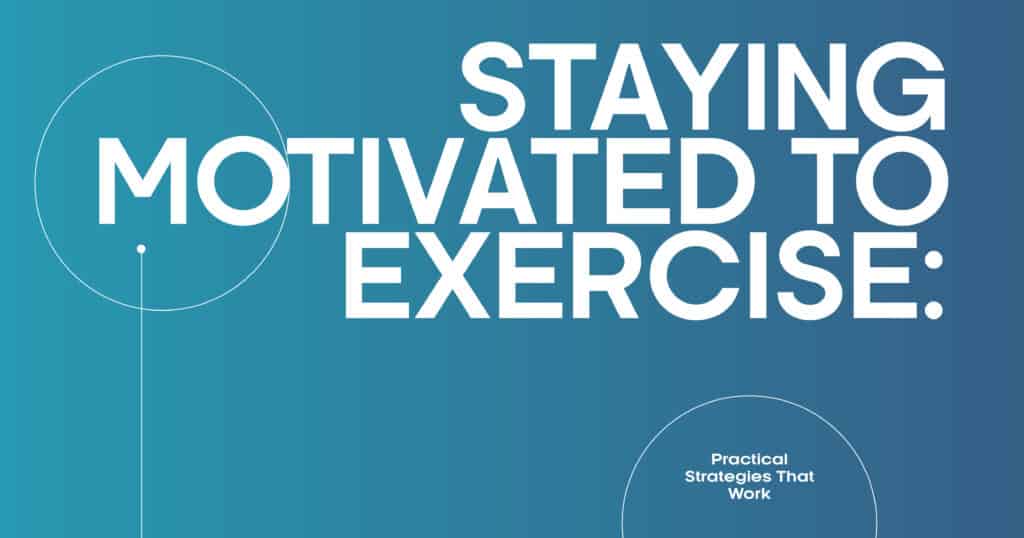Developing a workout plan is easy, but following through is different. If you have ever had concerns about getting motivated to work out, you are certainly not in this battle alone. Many people struggle with motivation to work out, especially when they lead busy lives or face setbacks in attaining desired results.
The good news is that workout motivation is not solely about willpower. It is about forming beneficial habits, setting achievable expectations, and overcoming mental hurdles. This guide presents valuable methods and tactics for motivating yourself to work out consistently and put in the work and effort required.
Why Is It Hard to Stay Motivated to Work Out?
Before we dive deeper into the solutions, what are the difficulties associated with remaining consistent with working out? Even the most dedicated people tend to encounter a drop in motivation eventually.
Common Reasons for Lack of Exercise Motivation
Unrealistic expectations of rapid results are one of the leading demotivators when it comes to exercising. Unfortunately, most people get disheartened and quit when they do not see obvious muscle definition and weight loss within a short period.
Not achieving instant progress can lead to a frustrating spiral and a severe lack of motivation. However, everyone needs to understand that, in the end, putting in the effort will yield tangible results.
Lack of Time Makes Exercise Feel Impossible
Motivation decreases with workouts when a person is short on time. People overlook exercising because they must deal with work, family, and social obligations. Others believe only spending extended hours in the gym will give them the desired results. The truth is that practical workout sessions can make a difference, no matter how short they are.
Boredom Can Drain Your Motivation
We cannot overlook boredom. Repetition with working out is helpful unless working out becomes monotonous, in which case, it could cause your motivation to wane. Repeatedly performing the same set of exercises can become a dreary obligation instead of a refreshing activity.
Mental Barriers Make Exercise Feel Overwhelming
Psychological obstacles can be equally challenging. Stress, worries, and a harsh inner voice may make it difficult to imagine working out. It is challenging to stick to a plan when exercising feels more like a punishment or failure rather than something achievable.
Not having goals is equally detrimental, and exercise without navigation can sometimes feel aimless and lack purpose. Motivation tends to fade without definitive reasons or tangible milestones to be achieved.
California Mental Health
How to Motivate Yourself to Work Out
Now that we know the common obstacles, let’s discuss how to motivate yourself to work out even when you don’t feel like it.
Creating a Routine That Works for You
An ideal schedule can make physical activity a regular part of a daily routine rather than a job that has to be done. Identifying a suitable time during the day is the best way to maintain consistency in physical activity.
Some individuals prefer morning workouts, as they help them launch their days feeling energized and focused. Others prefer evening workouts, which relieve stress after a long day. Starting small is another essential strategy. Many people lose motivation because they overcommit to long, high-intensity workouts immediately. Instead, beginning with 10-15 minutes of movement and gradually working your way up is more effective.
Combining it with an existing routine is a different technique to help improve exercise adherence. For example, if you usually watch TV during the evening, you can consider doing static stretches or low-impact bodybuilding exercises while watching. Such a sequence will make it easier to incorporate a new habit since it is anchored on something you perform daily.
Setting Realistic Fitness Goals
Setting realistic targets is vital to motivating oneself to exercise. Goals that are not clearly defined and quantifiable may lead to distraction, and the SMART method can help. Your goal should be precise, such as “I want to be able to do 20 push-ups in a row.” It should also be measurable, allowing tracking progress, such as your weekly running distance.
Goals should be realistic rather than unachievable. A two-month marathon goal will likely cause severe frustration if you’ve never run before. Instead, trying to run nonstop for five minutes may be much more effective.
Your goals also need to be relevant, which entails something that excites and motivates you. If dancing is your passion, taking a dance class would prove more exciting than building strength in the gym. Finally, goals need to be time-bound – assigning a deadline such as “I will be able to run a 5K in three months” would strengthen the commitment.
Overcoming Mental Blocks to Exercise
Even with the best plan, some people still struggle with mental resistance when it comes to working out.
Why Don’t I Want to Work Out?
In case hitting the gym isn’t quite your cup of tea, and you often think, “Hmm, what’s stopping me from working out?” there’s probably a logical explanation. The ever-present concern of not living up to expectations is one of the reasons. The fear of being unable to perform well or achieve results can prevent some people from working out.
Lack of motivation can amplify mental resistance when energy levels are already depleted. If you associate it with fatigue or difficulty, it’s normal for your mind to put up a fight. Other reasons include feeling judged at the gym or grappling with bodily movement during exercise, which can affect one’s coping mechanisms.
How to Overcome Mental Blocks
Letting go of mental opposition is much easier when you change your thoughts. Try reframing exercise not as a punishment but as an act of self-care. You should not feel obligated to move. You should want to.
Another great tip is to start small. If doing an entire workout seems too much, start with just five minutes of movement. Most of the time, you will want to keep moving once you start. Positive reinforcement is also quite helpful. Associating exercise with enjoyable rewards like a smoothie or a nice shower can make exercising easier.
California Mental Health
Staying Motivated for Long-Term Fitness Success
Consistency distinguishes fleeting results from lasting effort. Here is how to cultivate motivation to exercise for the long haul.
How to Stay Consistent With Your Workout Routine
Motivation can be significantly boosted with an accountability partner. If someone is counting on you to show up, there is a tangible difference in the likelihood that you skip workouts. This can be a friend, family member, or online fitness community. Having support can help you stick to your goals.
Keep Workouts Exciting by Mixing Up Your Routine
From an organizational perspective, splitting workouts into more approachable components may help with motivation. Less traditional forms of exercise, such as swimming, biking, or hiking, can help with boredom. Boredom is another factor to consider, and so is resting, which one’s body can help with.
Some days will call for more recovery than activity, which is fine. The aim should not be fullness but rather an unyielding, unwavering continuity.
Triggers can also serve as motivators to work more intensely. These may include putting on workout attire right after getting out of bed, setting up alerts on one’s phone, or putting a gym bag next to the door, which can all function as proactive propellants.
Tips to Make Exercise More Enjoyable
Do you dread traditional workouts? Not a problem! Physical activity does not have to feel mundane or boring. One of the best ways to motivate yourself is to find a fun activity you love. It can be ballroom dancing, martial arts, rock climbing, or even playing some sports; engaging in fun activities is great for staying active.
Make Exercise a Social Activity
Transforming exercise into a social activity can boost motivation. Attending group workout sessions, hiking with friends, and participating in sports can enhance physical activity.
Additionally, using fitness apps like Fitbit or Strava to track progress makes the journey more entertaining and motivates users. Including music in physical activity enhances motivation, So an energetic workout playlist can lift spirits during exercise motivation and make them feel less strenuous.
Take the First Step Today With CA Mental Health
The goal isn’t perfection. It’s to show up and be present, even when you don’t feel like working out. Whether the struggle is getting started or maintaining motivation, the secret sauce starts with mini-milestones, consistency, and, most importantly, having fun!
Do you need additional guidance to overcome psychological hurdles to exercise? CA Mental Health is available to assist you in building strong mental and physical resilience. Reach out to us now and embrace the first step towards a happier, healthier you.
California Mental Health
FAQs
How do I get myself motivated to exercise?
Obtain motivation worth your attention, set realistic goals, pick workouts you can enjoy, have supportive people beside you, and track your progress. All of these will motivate you.
Why can’t I get motivated to work out?
Often, the reasons for lack of drive stem from mental resistance, boredom, or having too high expectations. Work on changing your focus, changing your routine, and amplifying your enjoyment of exercise.
How do I motivate myself to work out?
Begin with light movements, such as walking or stretching. Incorporate activity into activities you already enjoy to make it a daily habit.
Why don’t I want to work out?
Diminished energy levels, stress, and negative past experiences all contribute to a lack of exercise motivation. It helps to pick activities that are fun rather than forced.
How to start moving your body?
Start with easy and light exercises like walking and stretching. These and your existing hobbies will gradually increase your daily activity levels.







